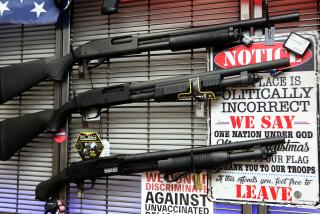Tax on Foreign Purchases May Be Rescinded : Travelers: Board of Equalization, smarting from criticism, admits its staff blundered when it imposed the levy without warning.
- Share via
Smarting from public protests over the sudden enforcement of a 1935 tax on overseas purchases, a State Board of Equalization majority took steps Wednesday to rescind a bureaucratic decision to tax residents who traveled abroad in 1989.
The board, admitting its staff had blundered when it decided to impose the tax without any warning to those who would pay it, implored its lawyers to find a legal way it could cancel tax notices that have already been delivered to California residents.
“This application of the tax is obviously a mistake and it was done I believe without proper foundation for the issuance of tax notices,” said Chairman Conway Collis.
Board member Paul Carpenter said the tax should never have been imposed retroactively on California residents who reported their 1989 overseas purchases to the U. S. Customs Service.
He urged the board, meeting in Torrance, not only to cancel the notices already delivered but also to abandon plans to mail another 54,000 later in the year.
“We want to find a way to legally stop imposing this unexpected tax until there is proper notice given,” he said.
If he has his way, Carpenter said, the board would only start imposing the tax on those who travel overseas in 1990.
The state use tax, which generally applies to any goods purchased out of state for use in California, has rarely been enforced because there was no way to monitor out-of-state purchases.
Then late last year, state tax administrators discovered that the U. S. Customs Service had upgraded its computer system so that it was now possible for them to gain access to declarations made by California residents. U.S. citizens who travel abroad are required to report their overseas purchases to customs as they re-enter the country.
The decision to tax those who took trips in 1989 prompted protests from hundreds of taxpayers. The protests came at a particularly sensitive time for the five board members, most of whom were preparing to file for reelection.
To add to their discomfort, board member Ernest Dronenberg said the elected officials had to contend with criticism because most of the bills were incorrect. He said taxpayers should have been charged the rate that was in effect when they traveled but most of them were assessed a higher rate that included a 1/4% tax to pay for earthquake relief. That tax went into effect in December.
“I’m afraid we have a lot of bad bills out there and the best thing we can do is pull those bills back,” he said.
But board member William Bennett insisted the panel has no legal authority to “suspend a tax.”
“We don’t have discretion, gentlemen. We just don’t,” he said.
Controller Gray Davis, who is also a member of the board, disagreed. He said the tax had been unenforced for so long that it could probably be considered “a new tax.”
Collis asked the board’s legal advisers to research the question in time for the panel to consider formal action to rescind the tax notices early next month.
Carpenter said the controversy over the tax notices is prompting some lawmakers to consider legislation to repeal the use tax altogether. He said he would oppose that action because he favors the idea of taxing people who “can afford to shop in Hong Kong.”
“After all, most of my constituents willingly pay sales tax at purchases they make at Sears and the May Co.,” he said.
More to Read
Sign up for The Wild
We’ll help you find the best places to hike, bike and run, as well as the perfect silent spots for meditation and yoga.
You may occasionally receive promotional content from the Los Angeles Times.






